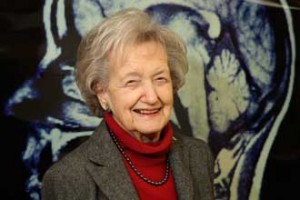
Dr. Brenda Milner wins prestigious International Balzan Prize
By Neale McDevitt
When Dr. Brenda Milner woke up on Sept. 8 for another day of work at the Montreal Neurological Institute (MNI) she was feeling a little under the weather. Things took a decided turn for the better around 7 a.m. when an excited friend called to congratulate her for being named one of four recipients of the prestigious International Balzan Prize for 2009 – worth approximately $1 million CDN. The thing is, Milner had no idea what they were talking about.
“My friend had read about it in the Gazette, so I ran right out and bought one,” said the the Dorothy J. Killam Professor at the MNI and McGill with a chuckle. “Sure enough, there it was. Needless to say, I am very excited.”
True to form, what excites Milner most is that the terms of the prize stipulate that half of the money must go towards research, “carried out preferably by young humanists and scientists.”
“There’s nothing I like more than encouraging young researchers,” said Milner who in 2007 created the $1 million Brenda Milner Foundation to support and foster young researchers in the field of cognitive neuroscience through postdoctoral fellowships at the MNI. “Now I’ll be able to work with them to design these research projects.”
The 2009 International Balzan Prize winners also include Terence Cave (UK), St John’s College, Oxford, for Literature since 1500; Paolo Rossi (Italy), Università di Firenze, for History of Science and Michael Grätzel (Switzerland/Germany), École Polytechnique Fédérale de Lausanne, for the Science of New Materials. Dr. Milner was awarded a Balzan Prize for Cognitive Neuroscience. The Balzan Prize fields vary each year and can be related to either a specific or an interdisciplinary field, and look to go beyond the traditional subjects both in the humanities (literature, the moral sciences and the arts) and in the sciences (medicine and the physical, mathematical and natural sciences), to give priority to innovative research.
Although it is too early to know what new research projects will benefit from the windfall, Milner says they will most probably be in the field of neuroscience, “something I know a little about.”
Again true to form, Milner is understating her position. Over the course of her extraordinary career, she has helped pioneer and shape the neurosciences. The origins of modern cognitive neuroscience of memory can be traced directly to her rigorous and imaginative studies. Nobel Laureate Eric Kandel credits Milner with taking the critical step of merging the fields of neurobiology and psychology to form this new field that has spawned a vast body of research in human cognition and has broad implications for the treatment of patients.
When asked if she ever dreamed of winning a million dollar prize for her research when she first embarked upon her career almost 60 years ago Milner laughs. “Good heavens, no. In those days I just hoped to get enough to scrape by and keep working.”
And keep working she has. At 91, Milner has accomplished enough to fill several lifetimes. But she scoffs at the idea of putting her feet up and calling it a career. “I’m not very good at relaxing because I like to be in the thick of things,” she said. “The Neuro is a magnet for me and as soon as I step outside I find my feet heading in that direction.”
With notes by Sandra McPherson
